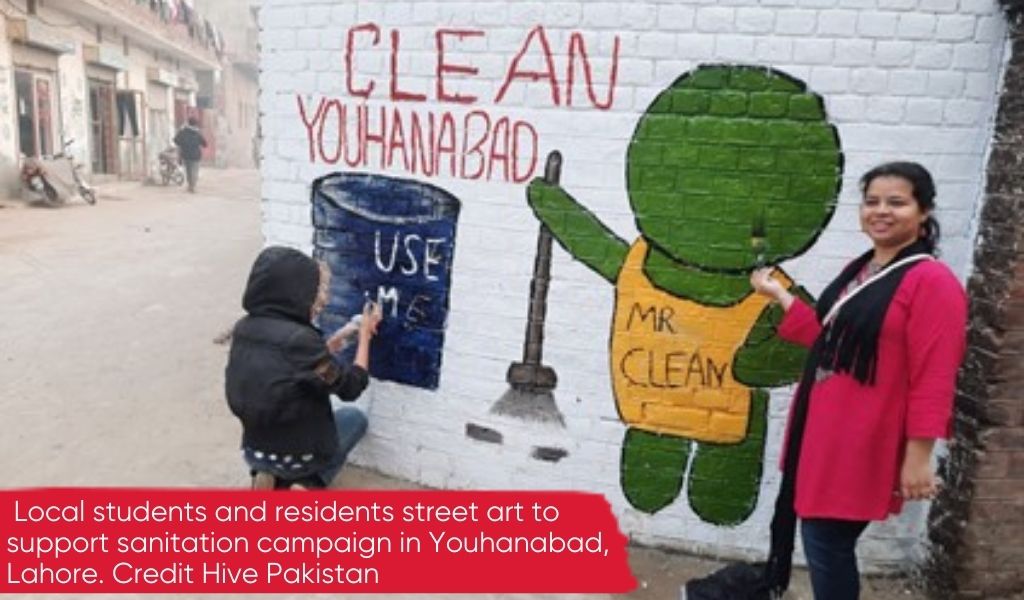Religious minority communities in Lahore, Pakistan, are frequently deprived of basic services such as access to clean drinking water and waste management which are available to neighbouring religious majority Muslim residents, according to research by local NGO, Hive, supported by Al Khoei Pakistan through the IDS-led CREID programme. These findings led to the creation of community-led committees within the Christian communities of Youhanabad and Joseph Colony, who, in partnership with Hive, co-designed interventions which led to the construction of a water filtration plant in Joseph Colony and a sanitation campaign in Youhanabad.
Over the last decade, the provincial government in Lahore has increased municipal service provision, such as the construction of water filtrations plants across the city, but prioritised locations accessed by the Muslim majority population. This resulted in the 4,000-5,000 Christian residents of Joseph Colony being deprived of safe access to clean drinking water because no filtration plants were located within walking distance of their homes.
Women, who have no access to transport (such as bicycles, motorbikes or cars) relied on the men in their households to obtain clean water. To do this, Christian men had to enter areas inhabited by a Muslim majority which is not without risk, since there’s a long history of violence and hostility towards the Christian minority (such as when 150 homes and two churches in Joseph Colony burnt to the ground in 2013 following an attack by a mob linked to an erroneous blasphemy charge). Access to clean water and sanitation services became even more important during the Covid-19 pandemic.
In Youhanabad, another Christian neighbourhood in Lahore which is home to around 150,000 residents, city waste management services were cut entirely during the initial phase of the Covid-19 outbreak causing mountains of garbage to accumulate in the streets creating an unsafe and unhygienic environment in which Covid-19 was more likely to spread.
Additionally, local mafia became involved in picking up the garbage from homes collecting monthly fees from each household for their services, but often doing a poor job and not following standard operating procedures (SOPs) which led to heaps of garbage at unallocated spots.
Community-led committees identify challenges and design interventions to address them
Hive, a local organisation supported by CREID consortium member Al-Khoei Pakistan, partnered with community-led committees (called Ravadar Committees) in these neighbourhoods to identify and design interventions to tackle these challenges.
In Joseph Colony, the community-led committee, consisting of four women and three men, participated in a feasibility and sustainability study to determine construction costs and operational overhead and logistics for the water filtration plant. This resulted in establishing a collective community supported fund to finance the electricity and maintenance costs required to keep the facility operational. The water filtration plant was launched and made operational on 12 December 2020 and now benefits more than 400 households on a daily basis, with a capacity of 1,000 litres per hour. On top of this, the project also generated enormous trust amidst a fearful community that has become used to being neglected (there are still signs of the burnt-out houses in the area) and also encouraged residents to be more socially involved in their community. The project helped to raise the profile of the community with local MPs, who attended the official opening of the plant, when they would normally only come to the area during election time.

In Youhanabad, Hive held consultations with community members to formalise a Ravadar committee which initiated a cleaning drive and lobbied with the municipal management to remove garbage. The cleaning drive was also an opportunity to spread awareness and share information about the second wave of Covid-19 situation among the community members by engaging them in discussions and pasting public service messages. This campaign went ahead in December 2020 with the help of local Lahore Waste Management Company (LWMC), was a huge success.
It included the following activities:
- Thirty workers, including those who were laid off as a result of late payments from the District Government to the companies contracted to undertake waste collection, and volunteers from community youth took part.
- An informational stall was installed on the first day of the cleaning drive at prominent and central locations of Youhanabad, sharing awareness leaflets and plastic bags for collecting waste
- A 40-second ad/ TVC in Punjabi was produced and telecasted on local TV cable networks of Youhanabad for five days. This ad emphasized the residents’ role to maintain cleanliness and proper garbage disposal and will be disseminated through social media and Whatsapp as well.
- Five spots were identified where residents often dumped waste and cleaned up. Their walls were painted with street art and cleanliness messages. The students involved were briefed on the situation and living conditions of religious minorities, and members of the community were also involved in the artwork. One waste management professional from ISP Environmental Solutions who saw the graffiti while driving past stopped to speak with volunteers and became interested in the project. After an hour she returned and gifted 15 small trees to the team which were planted around Youhanabad with the help of a local gardener. She also gifted antimicrobial gloves to the graffiti team.
- Street banners wished residents Happy Christmas, whilst also encouraging them to participate in the cleanliness drive .